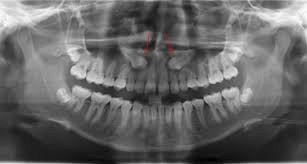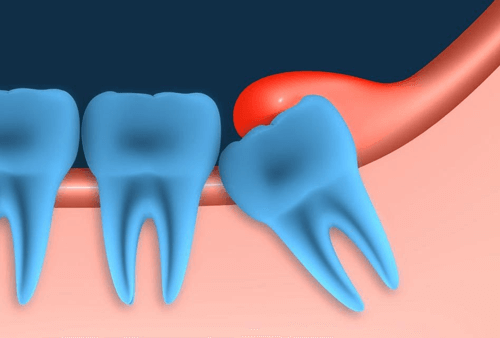Are teeth that have difficulties in erupting. Wisdom teeth and upper canines are the teeth that are usually impacted. There are a lot of factors that can influence the impaction, such as not enough space in the jaw, tilted tooth and more.
Causes:
There are numerous causes that can lead to an impacted tooth. The main reason for a tooth not to be able to erupt and become impacted is the lack of space in the jaws. That can happen as a result of genetics when the patient has inherited a smaller jaw bone and larger teeth. Another reason is the improper location of the dental gem. Some people have wisdom teeth located in the ramus of the mandible. Some patients happen to have extra teeth, which can also get in the way of the eruption. Some of these teeth will stay completely impacted, while others can become semi-impacted and erupt only halfway. Other reasons include a very dense bone structure or hyperplastic soft tissue.

Symptoms:
Impacted teeth are often asymptomatic. Patients find out that they have an impacted tooth during a regular x-ray scan. If the tooth starts erupting on the way up it can cause some symptoms and problems. The most common complication of impacted teeth is pericoronitis. It occurs when the tooth has is already partially erupted, and partially covered with soft and bone tissue. Pericoronitis is an inflammation of the soft tissue due to food retention. It can happen to everyone. Since the most commonly impacted tooth is the wisdom molar, it can be really hard for patients to provide good oral hygiene. The wisdom tooth is located way in the back of the mouth. Pericoronitis is manifested with a strong inflammation of the gingiva. You will notice red and swollen gums surrounding the tooth, bad breath, and a very unpleasant smell. The patient will have a difficulty in opening and closing the mouth. There might also be a significant swelling on the face located in the back of the jaw. Pain is also present especially when the patient tries to open the mouth. The surrounding lymph nodes will be swollen as a result of the inflammation. The dentist will have to prescribe antibiotics as a part of the treatment plan.

Treatment:
The treatment depends on the tooth that is impacted, the angulation, the location, the symptomatology and more. If it is the wisdom tooth, they are usually surgically extracted. If the second molar is not in a good condition, it is suffering from large caries, then some dentists might decide to extract the second molar and make space for the wisdom tooth to erupt. But this happens very rarely.
If we are talking about a canine, dentists usually consult with an orthodontist before starting a treatment. If there is a possibility for the tooth to erupt and be a part of the dental arch, they can surgically expose the bone, help it erupt and use orthodontic forces to lead its path to the dental arch. Sometimes these teeth are impacted horizontally in the bone, and nothing else can be done, except surgical extraction.




